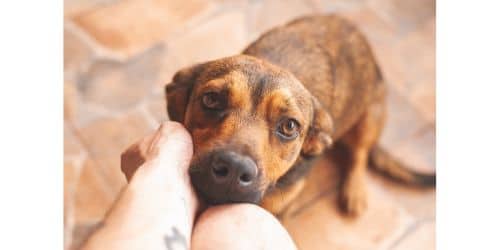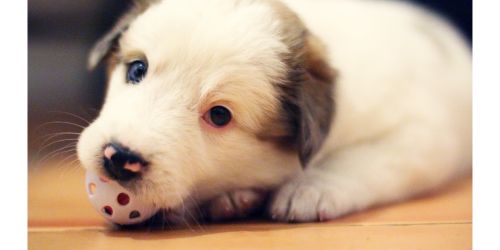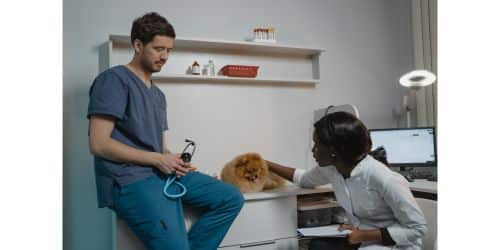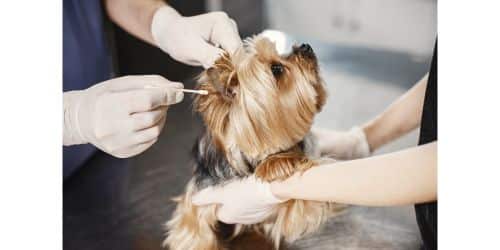We are all aware that dogs exhibit strange behaviors, but one that frequently takes owners off guard is when their furry buddy begins obsessively licking their rear end. It’s a circumstance that can leave you scratching your head and wondering what’s causing this behavior. In this post, we’ll go into the subject of dog butt licking, looking at the possible causes, whether it’s a cause for concern, and how to deal with it.
Dog Licking Butt a lot
If you’ve noticed your animal buddy obsessively licking their rear end, you might be wondering why they do so. While butt licking is a natural component of a grooming routine for a dog, excessive or continuous licking should be avoided. In this section, we’ll look at why dogs lick their butt excessively, whether it’s a cause for concern, and how to deal with the problem efficiently.
#1. Natural Grooming and Hygiene:
Dogs are noted for their cleanliness, and licking is an instinctive action that aids in personal hygiene. Dogs can clean dirt, debris, and even feces from their rear ends by licking them. It’s their method of staying clean and avoiding potential health problems. In most circumstances, butt licking in a dog is considered natural and not cause for concern.
#2. Scent Marking and Communication:
Dogs have an acute sense of smell, and their anal area has scent glands that secrete pheromones. These pheromones provide important information about a dog’s identification, gender, and even emotional state. When a dog licks its buttocks excessively, they may be attempting to disseminate their distinct scent and leave their imprint on their surroundings. It’s their way of communicating with other canines and establishing their presence.
#3. Irritation or Discomfort:
While some licking of the butt is typical in a dog, excessive licking may suggest discomfort or irritation. Dogs with anal gland disorders, such as impaction or infection, may lick their rear end excessively. Anal gland problems can cause discomfort and itchiness, causing greater licking to relieve the irritation. If your dog is excessively licking their butt and showing indications of discomfort, you should visit a veterinarian.
#4. Dietary Factors and Digestive Disturbances:
Excessive butt licking can be influenced by diet. Food allergies or sensitivities can cause gastrointestinal problems such as diarrhea or anal irritation, causing dogs to lick their rear end in reaction. Evaluating your dog’s food and ensuring they are on a nutritionally balanced and appropriate diet for their unique needs will assist in resolving the problem. Consultation with a veterinarian or veterinary nutritionist might provide useful information about your dog’s dietary needs.
#5. Parasitic Infections and Infestations:
Parasitic diseases, such as worms or fleas, can lead dogs to compulsively lick their rear ends. Intestinal parasites like tapeworms or whipworms can irritate the anal area, leading to discomfort and increased licking. Fleas, on the other hand, can cause severe itching and irritation in the vicinity of the anus. Regular parasite prevention and veterinary check-ups can help avoid and address these difficulties.
#6. Irritants and Skin Allergies:
Just like humans, dogs can be allergic to different environmental causes. Pollen, grass, some cleaning agents, and other irritants can cause allergic reactions in dogs, resulting in skin irritation and itching, particularly in the anal region. Excessive butt licking could be a reaction to the irritation caused by these allergies in a dog. Identifying and limiting exposure to probable allergies, as well as seeking proper veterinary advice, can assist in managing the problem.
#7. Anxiety and Behavioral Factors:
Excessive butt licking is one of the ways that stress, anxiety, or boredom can appear in a dog. Dogs may groom themselves excessively as a self-soothing reflex or in response to mental discomfort. If you feel that your dog’s excessive licking is caused by anxiety or behavioral problems, it’s critical to address the fundamental reason and provide appropriate behavioral enrichment and support.
When to Seek Veterinary Help
While occasional butt licking is normally harmless, there are times when you should seek veterinarian help for excessive licking in your dog. Monitoring your dog’s behavior and knowing when to consult a veterinarian is critical for their health and well-being. Here are some situations when to seeking veterinary assistance:
#1. Persistent and Excessive Licking:
It’s a red flag if your dog is continually and obsessively licking their butt to the point where it interferes with their everyday activities or becomes a compulsive activity. Excessive licking can signal underlying discomfort or medical issues that need to be addressed by a professional.
#2. Discomfort Signs:
Keep an eye out for any signs of discomfort in your dog. This includes scooting frequently, rubbing their back end against surfaces, and vocalizing when attempting to lick the area. These actions may indicate anal gland dysfunction, infection, or other uncomfortable disorders.
#3. Changes in Behavior or Appetite:
Excessive butt licking along with behavioral changes such as tiredness, loss of appetite, or unusual aggression may suggest an underlying health problem. A veterinarian should be consulted to rule out any medical explanations for these behavioral changes.
#4. Redness, Swelling, or Discharge:
It’s a clue that something is wrong if you observe redness, swelling, discharge, or any other anomalies around your dog’s anal area. These symptoms may be a result of infections, allergies, or other dermatological conditions that require veterinary diagnosis and care.
#5. Digestive Issues:
Dogs suffering from gastrointestinal issues, such as diarrhea, constipation, or frequent flatulence, may demonstrate excessive butt licking as a coping mechanism. You should consult your veterinarian to identify and treat the underlying issue if your dog is licking his stomach.
#6. Changes in Stool:
Any changes in your dog’s stool, such as blood, mucus, or an irregular consistency, should be noted. Such alterations may indicate gastrointestinal problems or parasite infections, both of which may contribute to excessive butt licking. A veterinary examination can aid in the diagnosis and treatment of certain illnesses.
#7. Previous Anal Gland Problems:
If your dog has a history of anal gland issues, such as recurring impactions or infections, it’s critical to monitor their butt-licking behavior. Excessive licking may suggest a recurrence of the problem or additional issues that necessitate veterinarian care.
Remember that your veterinarian is the best person to analyze your dog’s health and provide suitable advice. Based on their findings, they can do a comprehensive examination, perform relevant tests, and offer appropriate treatment options.
To summarize, if your dog’s butt licking is excessive, chronic, or accompanied by discomfort, behavioral changes, irregular stool, or other alarming symptoms, it’s critical to seek veterinary attention. Early intervention can help identify and manage any underlying medical issues, ensuring your pet receives the care he or she requires and is relieved of pain.
Controlling Excessive Butt Licking
Excessive butt licking in a dog requires a multifaceted strategy that focuses on identifying and addressing the underlying cause. Here are some methods for managing and reducing excessive butt-licking in a dog:
#1. Veterinary Examination:
Make an appointment with your veterinarian to assess your dog’s health. They can do a complete checkup, analyze any potential medical conditions, and make treatment recommendations.
#2. Treat Underlying Medical Conditions:
If an underlying medical disease is discovered, including anal gland disorders, infections, allergies, or gastrointestinal concerns, follow your veterinarian’s treatment recommendations. Medication, dietary changes, and other interventions may be used to reduce discomfort and resolve the underlying issue.
#3. Parasite Prevention:
Follow your veterinarian’s recommendations for regular preventive measures against parasites like fleas, ticks, and worms. This reduces the possibility of infestations and the related discomfort, which may contribute to excessive butt licking.
#4. Dietary Modifications:
Work with your veterinarian to ensure that your dog is eating a nutritionally balanced diet that is appropriate for their needs. In some cases, dietary changes—such as switching to a hypoallergenic or easily digestible diet—can help control digestive problems and stop butt-licking brought on by food allergies or sensitivities.
#5. Environmental Allergen Management:
Take steps to reduce your dog’s exposure to environmental allergens if they are suspected of causing excessive butt licking. To lower allergen levels, keep your dog indoors during high pollen seasons, utilize air purifiers, and clean their living area regularly.
#6. Behavioral Enrichment:
Engage your dog in mentally interesting activities to assist in refocusing their attention and alleviate anxiety or boredom, both of which can contribute to excessive licking. To keep children mentally interested and occupied, provide engaging toys, engage in regular exercise, and consider training or puzzle games.
#7. Stress Reduction:
If your dog’s excessive licking is caused by stress or anxiety, identify and address the triggers. Provide a designated safe zone for your dog and consider approaches such as behavioral training, pheromone diffusers, or soothing supplements under the supervision of a veterinarian or a professional dog behaviorist.
#8. Comfort and Hygiene:
Maintain adequate hygiene in the anal area of your dog. To remove any collected dirt or irritants, clean the area regularly using pet-safe wipes or warm water and mild soap. After that, carefully dry the area to avoid moisture problems. Avoid using harsh chemicals or wiping excessively, since this might aggravate the sensitive skin.
#9. Use Deterrents or Protective Measures:
Your veterinarian may propose deterrents or protective measures to avoid excessive licking, depending on the underlying cause. To block access to the anal area, Elizabethan collars (cone collars) or customized clothes may be used.
#10. Regular Veterinary Check-ups:
Schedule regular check-ups with your veterinarian to evaluate your dog’s development, discuss any problems, and make any necessary adjustments to the treatment plan. They can offer ongoing advice and help safeguard your dog’s health.
Remember that each dog is unique, and the best care strategy will depend on the underlying cause. It is critical to work closely with your veterinarian and follow their instructions to effectively manage and prevent excessive butt licking in your dog.
Keeping Good Hygiene and Caring
In addition to addressing the underlying causes, it is critical to maintain appropriate hygiene and care for your dog’s anal area. Clean the area regularly using pet-safe wipes or warm water and mild soap. Avoid using harsh chemicals or wiping excessively, since this might aggravate the sensitive skin. Maintaining a clean and dry environment can help avoid bacterial or fungal infections and reduce discomfort.
What are the causes of excessive licking in dogs?
Excessive licking in dogs can result from a variety of circumstances, including:
- Medical Conditions
- Anxiety and Stress
- Allergies
- Behavioral Issues
- Pain or Discomfort
- Gastrointestinal Issues
- Habit or Attention-Seeking Behavior
It should be noted that establishing the underlying reason for excessive licking necessitates a complete examination by a veterinarian. They can assess your dog’s medical history, perform necessary tests, and provide an accurate diagnosis to lead the treatment strategy.
Is it a sign of a medical condition?
Yes, excessive licking in a dog might be a sign of a medical problem. It is critical to distinguish between typical grooming behavior and excessive licking. While dogs normally groom themselves to some extent, excessive licking is deemed abnormal.
How can I stop my dog from licking his butt so much?
To help reduce your dog’s excessive butt-licking, consider the following strategies:
- Veterinary Examination
- Address Underlying Medical Conditions
- Behavior Modification
- Distraction and Redirecting
- Environmental Enrichment
- Environmental Management
- Elizabethan Collar (Cone Collar)
- Positive Reinforcement
- Consult with a Veterinary Behaviorist
What to do if my dog keeps licking her bum?
If your dog keeps licking their butt, they may have a food allergy. Consult your veterinarian to determine your dog’s food allergy. They will almost certainly recommend avoiding a specific meal for some time to see whether the allergies clear up.
Why is my dog licking his private area so much?
They need to wipe their genitals of dirt and discharge, and they don’t use toilet paper for their anal region, therefore they use their tongue. Dogs also do not have any physical issues. They aren’t ashamed to groom their crotch regardless of who’s watching.
How do I know if my dog has worms?
How to tell if your dog is infected with worms:
- Diarrhea, sometimes containing blood or mucus.
- Vomiting, which can sometimes contain adult worms.
- Weight loss, particularly if your dog has a good appetite.
- A bloated belly or generally “unhealthy” appearance.
- A dull, dry coat.
- Excessive scooting and chewing at their bottom.
Conclusion
Natural grooming instincts, communication, discomfort, food difficulties, parasites, allergies, or behavioral factors can all contribute to excessive butt-licking in a dog. While occasional butt licking is natural, persistent or excessive licking may suggest an underlying issue that needs to be addressed. You can effectively address the issue and ensure your dog’s well-being by knowing the various reasons and seeking veterinarian advice when necessary. Remember that a happy and healthy dog requires a holistic approach to their entire care, which includes hygiene, food, and emotional support.
Related Articles
- Top Natural Home Dog Licking Paws Remedies
- Home Remedies For Dog Scooting
- What is the Best Flea Treatment for Puppies Under 12 Weeks?
- Why Is My Dog Chattering Its Teeth?
- The Top 5 Best Dog Care Shock Collars






